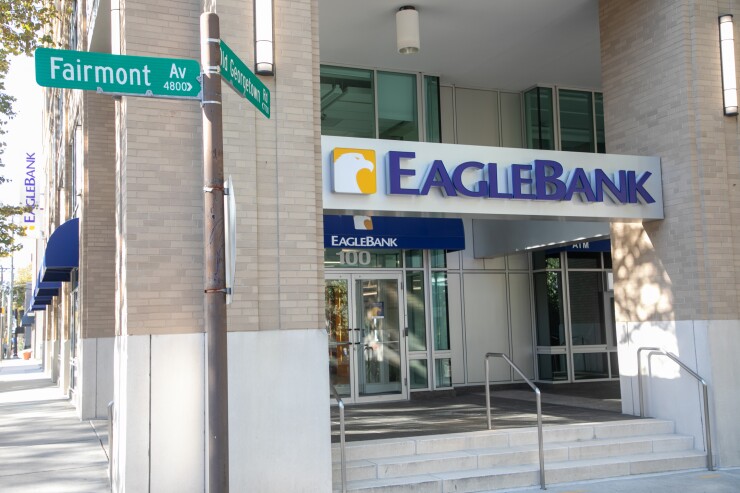
The
Eagle Chief Financial Officer Eric Newell described the move in an interview "as good corporate housekeeping" that "gives us flexibility" — as opposed to a sign the company needs to raise capital.
He said that, should the company raise money, it would likely be done through a debt or preferred stock offering. Newell also noted that Eagle has subordinated debt maturing in September, and the shelf registration allows the company "to be opportunistic" as it considers refinancing that obligation.
Eagle recorded a $35.2 million provision for credit losses in the first quarter on an office property in Washington whose value was reappraised at about half of its prior value.
Commercial real estate makes up more than 60% of the bank's loans. Urban office CRE, in particular, is under pressure across the industry as landlords grapple with higher vacancy rates amid enduring remote work trends.
Eagle's shares traded between $19 and $20 intraday Thursday, down more than 30% from the start of the year.
Though Newell described Eagle's recent
Newell said federal government work forces that pepper the capital city's downtown have been affected by remote work. But he emphasized that the bank's CRE book is spread across various sectors and markets, including the D.C. suburbs. He said the first quarter office hit was not indicative of systemic issues in the bank's loan book.
"Not every office property is downtown, and not every CRE credit is an office loan," Newell said.
Michael Jamesson, a principal at the bank consulting firm Jamesson Associates, said lenders are increasingly scrutinizing their CRE portfolios and charge-offs are accumulating. But, he said, banks for the most part are reporting "one-off or two-off" loan problems and ensuring investors that the isolated challenges are not thought to mark the beginning of broader and rapid credit quality deterioration.
"Now, banks always say that, but the data seems to validate the story for now," Jamesson said. "At this juncture, it looks like we'll
Provisions for expected credit losses across all U.S. banks declined in the first quarter to $21.1 billion from $24.4 billion the prior quarter, according to S&P Global Market Intelligence data. The decline came as net charge-offs held essentially flat at $20.3 billion. First-quarter provisions as a percentage of charge-offs fell to 104% from 121% the previous quarter, suggesting banks on the whole see
"I'm sure we'll see more signs of stress at points this year, and some banks will have more problems than others," Jamesson said. "I don't see a calamity in waiting."
In its SEC filing earlier this month, Eagle said if it decides to raise all or some of the $150 million, it could use the money to refinance debt — its debt maturing in the fall totals about $70 million — or it could use the funds to bolster capital, pay dividends or buy back shares.
For the first quarter, the company reported net charge-offs of $21.4 million, up from $11.9 million the previous quarter. Nonperforming assets of $92.3 million equated to 0.79% of total assets, up from 0.57%.
Capital levels were lower than in 2023, but all measures exceeded regulatory requirements. Eagle described its capital positions as "strong."
At the close of the first quarter, the common equity ratio, tangible common equity ratio, and common equity Tier 1 capital to risk-weighted assets ratio were 10.85%, 10.03%, and 13.80%, respectively.
Eagle reported a net loss of $338,000 for the first quarter, compared to net income of $20.2 million for the fourth quarter of 2023.
However, the bank's pre-provision net revenue of $38.3 million for the first quarter was nearly even with the prior quarter's $38.8 million.
"We earn really well," Newell said. He said that, once the bank works past the recent credit set-back, this could be evident in future quarters.
As far as downtown Washington office properties, Newell said some areas of the federal government have proven slow to bring workers back to offices full time. But he said Eagle is bullish on the nation's capital because the long-term trajectory of the federal government is one defined by substantial growth. The District of Columbia's economy, by extension, is likely to expand in tandem.
Of the capital's ties to federal spending, Newell said, "we believe it is still a differentiator in a positive way."






